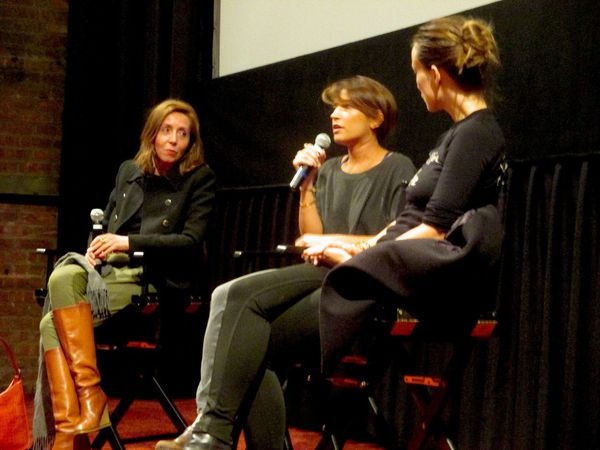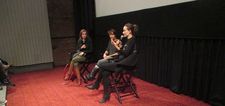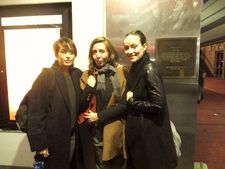 |
| Reed Morano with Anne-Katrin Titze and Olivia Wilde: "The idea of hearing the occasional sound is actually what we did …" |
Olivia Wilde took a break from filming her new HBO television drama Vinyl, created by The Wolf Of Wall Street screenwriter Terence Winter, executive produced by Mick Jagger and Martin Scorsese, to join Meadowland director/cinematographer Reed Morano for an opening weekend post-screening discussion. In Vinyl, Wilde co-stars with Bobby Cannavale, Paul Ben-Victor, P. J. Byrne, Emily Tremaine, Jack Quaid, Birgitte Hjort Sørensen, Max Casella and Juno Temple, who is also featured in Meadowland.
_225.jpg) |
| Olivia Wilde as Sarah: "She is grasping for ideas on how to feel less numb." Photo: Reed Morano |
The prominent contributions of the Meadowland crew, including Tony Volante, Madeleine Gavin, Kevin Akers, and Frank Larson were noted. I compared Sarah's silent scream to that of Rod Steiger in Sidney Lumet's 1964 The Pawnbroker and Reed explained some of the mysteries in her sound design. Olivia told us how Jason Sudeikis and her dog played a silent role in getting to become Sarah, Reed and her approach to the main character's grief, cutting, nine-minute takes fit for a French movie, how the language of film we all speak allows for creative leaps an intelligent audience appreciates and the joys of filming on Times Square.
Anne-Katrin Titze: There is a moment, a Pawnbroker moment, when you, Olivia, have a silent scream. When we were talking before about sound, Reed, you mentioned how important it was for you, who come from cinematography. Can you talk about the silent scream, sound and lack of sound?
Reed Morano: I remember you noticed that the beginning of the movie starts out with sound but black, no picture. And it's weird, I never really consciously thought about that but I do feel like sound was so much more important to me than the visuals. I told Tony Volante who is the sound designer, "I promise you the sound is going to be so trippy." And he really delivered and brought amazing things to the table. The idea of the silent scream, of not hearing, it's kind of when you're crying yourself, when you're having a breakdown yourself - you don't really hear yourself.
 |
| Reed Morano on Sarah's silent scream: "You're in your own thing and you don't hear it." Photo: Reed Morano |
It's not like you want to hear yourself underwater, which has been done a million times in movies. You're in your own thing and you don't hear it. At that moment it could be too melodramatic to hear everything. Already it's very difficult to watch. The idea of hearing the occasional sound is actually what we did - that's also a credit to my editor, Madeleine Gavin, because we came up with this together - an occasional sound would leak out.
We did other things with sound. For example when Sarah is cutting herself there is a certain moment where she opens her mouth and there's a sound that comes out and it's actually one of Jesse's [her son played by Casey Walker] lines run backwards - saying "It's not me doing it, it's the cookies." Nobody really knows what that is. It's so powerful to me.
AKT: You bring up the cutting. There is the scene when Sarah first notices a new strategy that she learns from Alma. There is a moment of epiphany in a negative sense. There is a teacher - student reversal and it seems to be when Sarah realizes "Now I want pain. I want that it hurts." Can you talk about how were dealing with that moment?
(1)_225.jpg) |
| Olivia Wilde on pursuing Sarah: "I knew of Reed, I knew of her work as a cinematographer." Photo: Reed Morano |
Olivia Wilde: Sure. That is initially what Sarah believes she's going to find with this. She is grasping for ideas on how to feel less numb. The idea of inflicting physical harm is appealing to her after seeing Alma [Eden Duncan-Smith]. When she actually experiments with this, what she finds is instead of pain, it's an incredible release. It's almost this climax of satisfaction. She is releasing this pent up pressure that had become unbearable. And this is all stuff that I had got from someone, a friend of mine, who was very brave and gracious to share with me her experience in cutting. I wouldn't have dared to assume these things without hearing it from someone with personal experience.
I wasn't sure how to approach that scene. After she gave me these clues on how it was for her, I suddenly understood what the scene was and what this tactic was for Sarah. Then I shared that with Reed and the way that Reed shot it really captured that it was more about the relief that Sarah was feeling than the damage she was causing. You know, the interesting thing about this film for me is that it doesn't underestimate the intelligence of the audience. There are many things that we've all seen in films that we can assume.
We developed a sort of language that we all speak, that we are fluent in. When we see, for instance a scene about a child being abducted, we don't necessarily need to see that the police arrive. We assume such. Same with cutting. We know what's happening because of the images we've all been exposed to. We have an audience that has seen so much great cinema that we can tell stories that skip certain steps. I feel that Reed took such advantage of the intelligence of the audience and the cutting scene was certainly an example of that.
 |
| Olivia Wilde on Times Square: "There's also a sense in the Times Square scene that it is a foreign land." |
AKT: Of course, as everybody who makes films knows, the first place you go is Times Square. That's the ideal place to film, the easiest to get to, just the most wonderful place…
Olivia Wilde: ...To relax!
AKT: Yeah, it's so relaxing. You are wearing this yellow hoodie, as I told Reed, as Little Yellow Riding Hood, lost in Times Square. Talk about filming there!
OW: We loved the idea that Times Square is one of those populated places in this country that you would, if you were searching for someone, you would run into them. It would be a good bet that you would run into them, catch a glimpse of them here. That was part of what is going on in Sarah's mind. It's also an example of the fact that when you are grieving that you are so isolated that even in the most populated place you feel deeply alone.
There's also a sense in the Times Square scene that it is a foreign land. There's something that makes Sarah seem like an outsider. We did two takes of that. One nine minutes uninterrupted, handheld, Reed following me at a brisk pace walking through Times Square. The other was 11. It's just incredible that she was able to pull that off. If this movie were, like, French, we would include the entire take.
RM: I actually had it in my head that we could include the entire take. We got to, like, 30 seconds on screen and I was like, what am I thinking!
 |
| Reed Morano, Anne-Katrin Titze and Olivia Wilde at Village East Cinema |
OW: It's interesting, we originally had the idea that she'd think she saw her son there. We steered away from flashbacks, for instance. That was a really great choice by Reed to avoid that trope that is often used in these types of stories to really make the audience feel - oh, no they really loved this child - see, here's a memory of it! We knew the audience would understand that they loved this child. To use that moment of a little bit of a hallucination was as far as we would go into that sort of device.
Logistically speaking, it's the kind of feat that most directors do not try to pull off. It was one of the wonderful manifests of being a bunch of New Yorkers shooting a film in New York. It's interesting, you think people in New York have seen everything in Times Square and yet people are still really interested in running at you when you have a camera. Reed was pushing people away with one arm while operating with the other. And Kevin Akers, our focus puller as well. It was a group effort, the effect of which, I think is just mesmerising.
AKT: Another mesmerizing thing you captured about New York is that pink swirly sky. New Yorkers know that we sometimes see this ice cream sky. You got a few moments of that.
RM: Yeah. There's one at the beginning when we were shooting one day outside. We were actually supposed to wrap. It's right before the scene where the friends are having dinner and Margot Hand, our producer, who is sitting over there [in the audience], let me get one more shot. What I like about it is that it's very surreal. To me it's like a visual representation of what it feels like when anyone goes through tragedy or a situation that turns their life upside down. It's that moment when your whole life feels like the Twilight Zone. And you're like, this is the new life I have to get used to. It will take you years maybe. It's almost this apocalyptic weird sky and we were lucky enough to catch it a couple more times. I had a camera operator on the movie, named Frank Larson, unfortunately for him I basically didn't let him operate a lot of the movie.
 2_225.jpg) |
| Sarah (Olivia Wilde): "There's something that makes Sarah seem like an outsider." Photo: Reed Morano |
AKT: I love how you mention all the people you worked with on the movie by name! Not many directors do that.
RM: They are the reason why the movie was possible. He did go up onto the roof of the apartment building and got the panning, the beautiful shots panning across the skyline, I asked him to get and the clouds and all these things. He got all those for me in like one or two afternoons. It just blew my mind. It's like the glue that holds the whole movie together.
AKT: The twilight toned sky also matches the Emily Dickinson poem - "Because I could not stop for death, he kindly stopped for me."
Olivia Wilde at the end of the conversation gave us some insight on how she became a part of Meadowland, in which she shows us Sarah's descent into hell without a trace of vanity and with each painful epiphany registering as defiance against an unfair world.
OW: I received the script in the traditional way. I got the script from my agent. I read it immediately and freaked out because I loved it and I loved this role. And I called and I said, "What's Meadowland? What is this? I want to do this!" And they said - I let them never live this down, I love to torture them - "It's really competitive." I was like, thanks for the fucking pep talk. Now that you said that, I'm going to fight for it. I was like, okay, I understood the situation. When do you set up the meeting? And they said, "well, you can meet her at the Bowery, she is meeting lots of people." Great, whatever. I knew of Reed, I knew of her work as a cinematographer. I knew she was extremely extraordinarily talented.
 |
| Sarah in yellow hoodie at times resembles a Little Yellow Riding Hood Photo: Reed Morano |
It was supposed to be a forty minute meeting and we met for almost three hours and we really connected on our opinion of Sarah, our respect for Sarah, our idea that she was not this zombie dragging her feet through this grief, that she actually had quite an enigmatic edge to her. That really excited us that we both found that in her. That we both thought the film was really thrilling. It wasn't depressing, it was thrilling. We thought there's something really dangerous about grief at this particular stage. And we thought it was fascinating to follow two very different people on two different isolated journeys of grief.
This all came out in this kind of exhilarating first date. At the end of the meeting I said " Reed, I know people are coming after you for this role." And she said, "Yeah, it's exciting people are responding well to this." And I said: "I just want you to come to my house, to my apartment, and shoot me doing some of these scenes. And if you like the idea that I have of Sarah, then we should do this together. If not, no hard feelings, then I'll work with you somewhere else."
And she agreed and came to my apartment. I locked my fiancé [Jason Sudeikis] in a room. And was like, "It might take 30 minutes. You can't say anything, you have to be really quiet." So I put him and the dog in a little office. And like two and a half hours later, I let them out. Because we had this exhilarating audition, that made me want to work for her even more because the notes she had even for an audition were so unusual and interesting. A perfect example that exemplifies your style - there was originally a scene in the script where Sarah walks in and Phil [Luke Wilson] is folding a shirt that used to be worn by Jesse and it was an extremely painful thing for them both to recognise that shirt and what it meant to them.
The first time in the audition I did the scene in more of a traditional way in this heartbreaking moment. And Reed says "Okay, now don't be willing to admit that this pain would exist. Because you refuse to acknowledge that he may be gone. So just give nothing or feel nothing." Man, the director who gives you the direction to feel nothing, is like the most badass thing I've ever heard. Most directors are begging for more emotion and asking you to just emote so that they look like they got something from you. And I just knew she was different based on that small little note. I was desperate for that one because she was so cool and smart and then she gave me the role. That's my story.
RM: That's pretty much how it happened.
Vinyl is scheduled for 2016 on HBO and Reed is the cinematographer on a number of episodes. Meadowland is in theaters in the US.





















